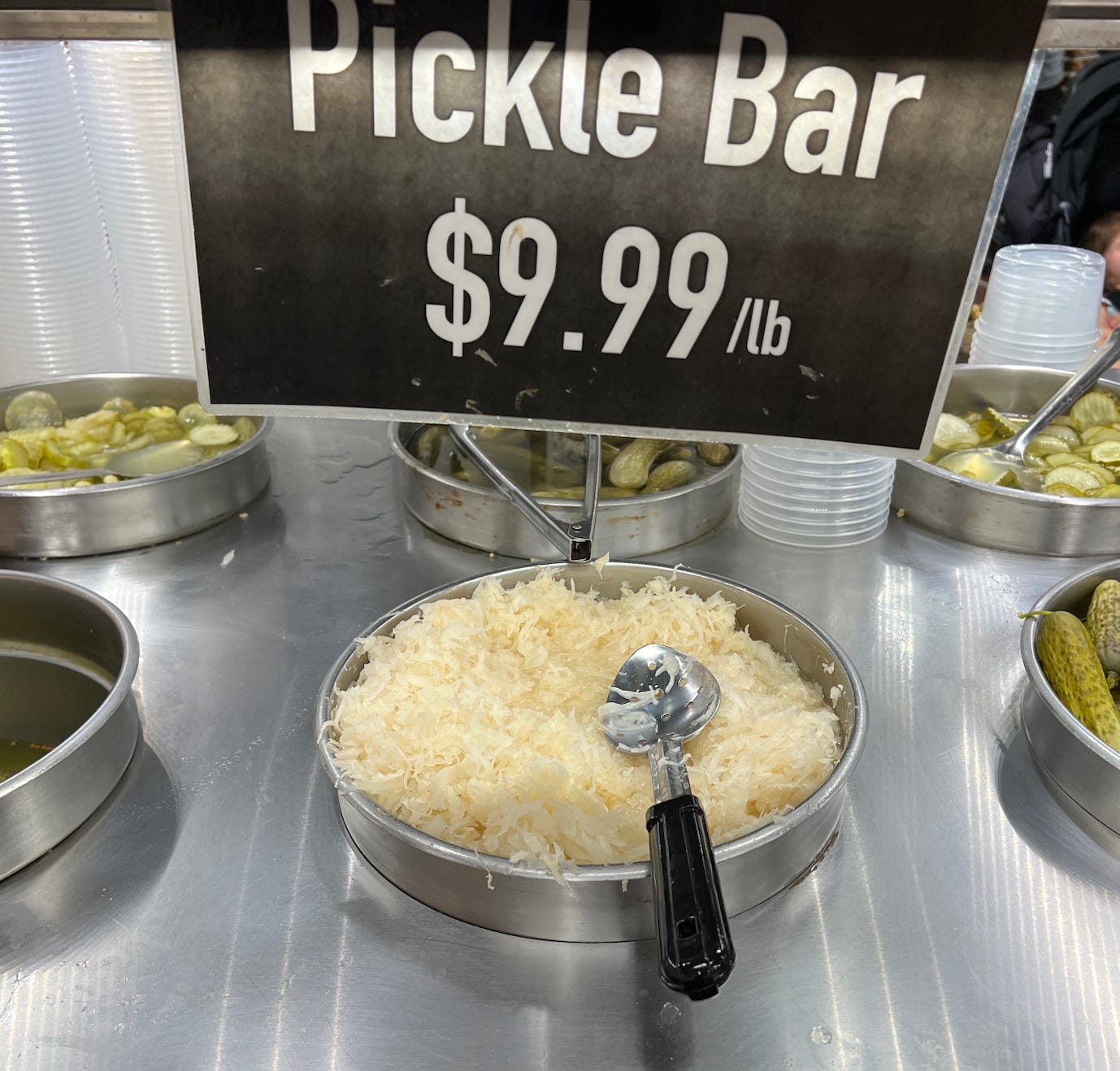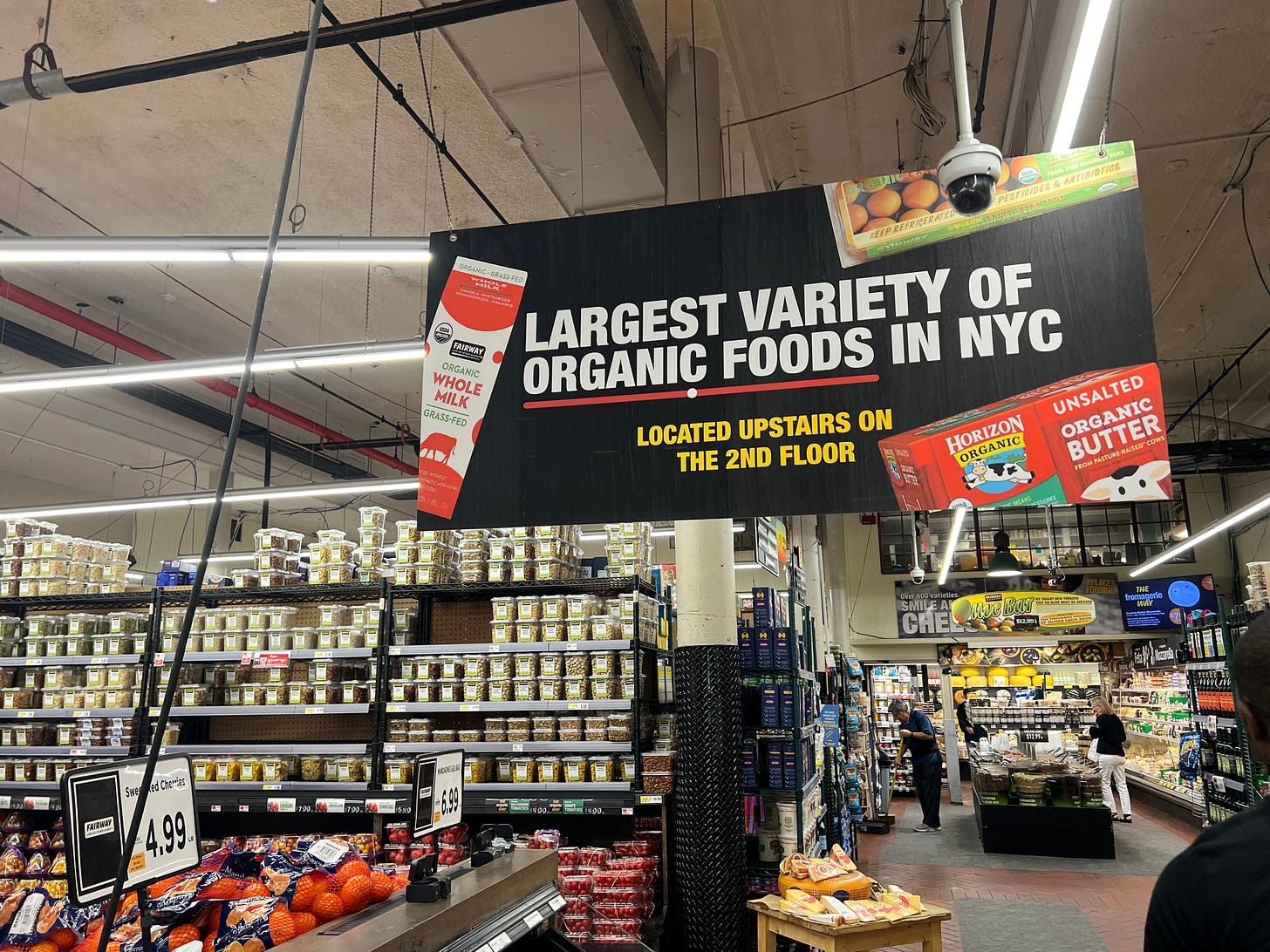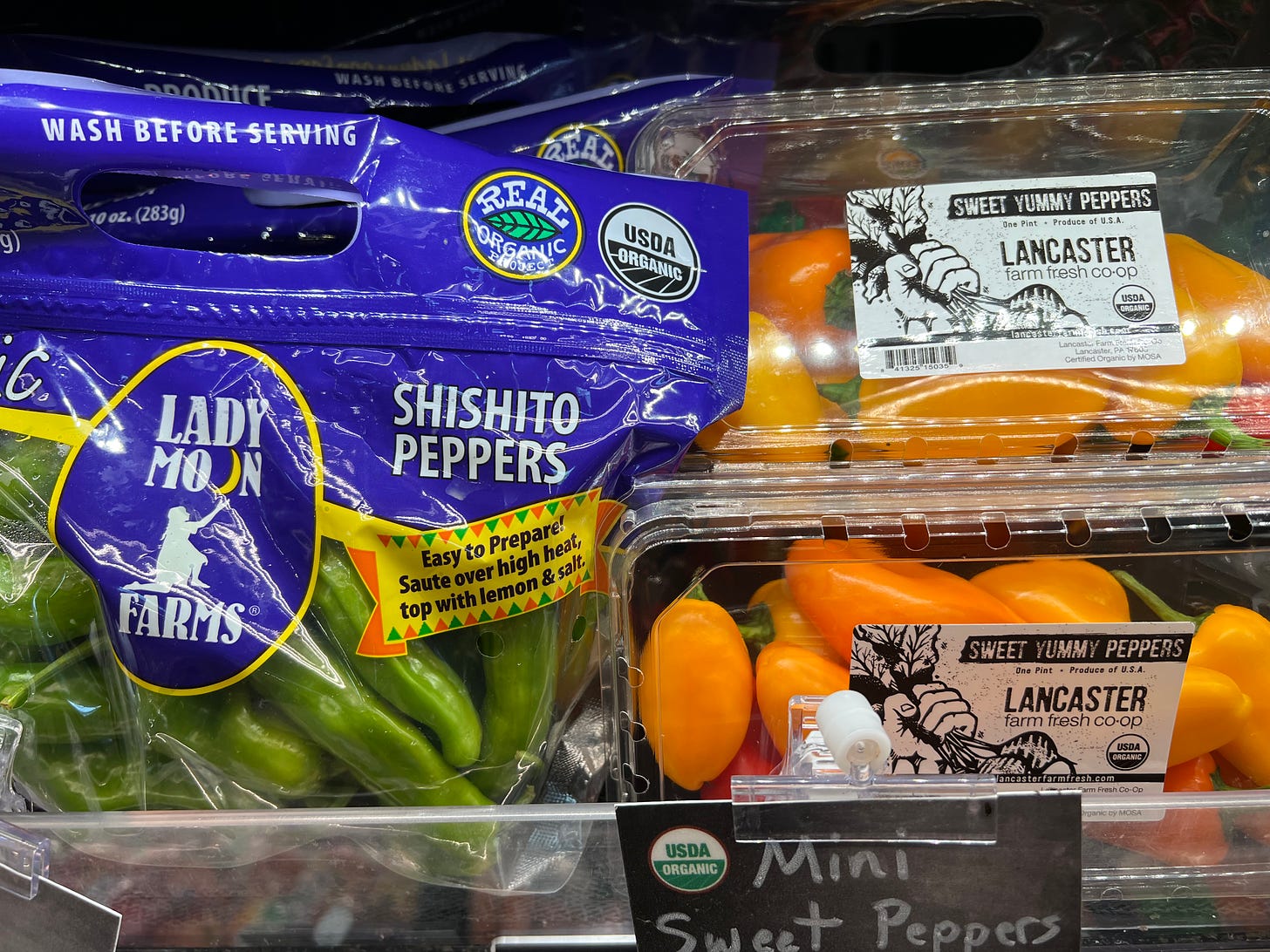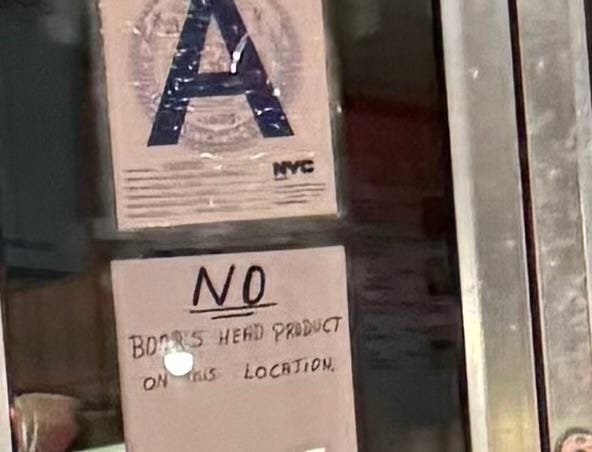Discontents: 1. Grocery Update AMA: Coming Soon. 2. Cooks Venture Lawsuit. 3. New JBS Hipster Meat Shops. 4. How Fairway Got Its Groove Back. 5. Grow Ahead Week Of Action for Agroforestry. 6. Seen In the Wild. 7. Tunes.
1. News and Stuff:
Stay tuned for an announcement on an upcoming Grocery Update AMA for founders and paid subscribers. Coming Soon!
2. Cook’s Venture Lawsuit.
According to Food Dive, thirteen poultry growers are suing the leadership of Cooks Venture for deceptive and unlawful conduct. The farmers lost hundreds of thousands of dollars to the company when Cooks declared bankruptcy in 2023. The company convinced dozens of poultry growers to mortgage their farms and homes to start raising chicks for their “regenerative” chicken supply chain. Cooks Venture claimed to support sustainability and farmer welfare but operated as a “defacto ponzi scheme”, marketing itself as a “tech-style” disrupter to big agribusiness monopolies.
The growers are seeking “restitution and compensation for unpaid services”. Farmers were in the midst of raising over one million birds and were then left with the morbid job of euthanizing and disposing of the carcasses. The attorney representing the farmers said in a statement, “In order to bring about a food system that’s better for farmers, animals, and consumers, we need to make an example of all companies that falsely claim to be doing things the right way”.
3. JBS Hipwashes CAFO Meat.
Global meat conglomerate JBS is opening hip new meat and seafood retail outlets in a number of metro areas around the U.S. Called Wild Fork, the shops will sell frozen meat, including beef, pork, lamb and chicken, as well as seafood, produce and prepared meals.
JBS is one of the largest food and agriculture firms in the world, with over $70 billion in annual sales. They are the world’s largest meat processor, bigger than rivals Tyson, Cargill and Smithfield. These four companies control 50-80% of all beef, pork and poultry processing in the U.S. and each saw enormous profits as they raised consumer prices well above the rate of their own cost increases. Beef retail prices were up over 50% in the past four years. JBS has also been known for environmental and human rights abuses, including sourcing beef from cleared rainforests and from farmers linked to killing indigenous people, as well as bribing public officials, underpaying ranchers and family farmers in the U.S. and exploiting meat packing workers with low pay and dangerous working conditions. The company slaughters thirteen million chickens, 128,000 pigs, and 77,000 beef cows every day. They are even getting sued by New York for their misleading environmental claims. If there was a textbook definition of industrial meat production and its catastrophic impacts on climate and society, it would be JBS. JBS, the ultimate meatfuckers. Not hip.
But through the magic of pandering to millennials and Gen Z, JBS will be marketing Wild Fork as a fresh-focused, trend forward, brick and mortar with E-commerce and in-store pickup. They plan to build over 200 stores. Austin Frerick, author of Barons, which details the business models of conglomerates like JBS, states, “This is another example of JBS exploiting the image of family farms to their detriment.”
JBS is also leveraging the bizarre culture-war fetish of increased meat consumption among young men, coupled with consumer skepticism of processed foods. So seriously guys, eat more vegetables. Eat more beans and lentils. A little tofu now and then won’t kill you. You will feel better, maybe be more regular too. And you won’t be enabling the biggest meat processor in the world to devour even more market share.
4. Main Feature:
How Fairway Got Its Groove Back.
The phone number is on the awning. Doubtless, local customers still call this number. And it is a coveted 212 area code. Who still gets one of those? So old school. Legit, authentic. The awning itself is a brackish green, the color of the Hudson River in October. It hangs over most of the block, keeping the sun off the quintessential New York City merchandising, fresh produce neatly spilling out on the street, lemons, tomatoes on a vine, local peaches, cantaloupes, avocados and oranges. Like how grandma shopped in Washington Heights 70 years ago.
But I get ahead of myself. Getting off the uptown Broadway line at 72nd street, I have been making the bee line two blocks north to a singular destination for over 25 years. The pickle bar. Cut through produce, deflect the starchy temptations of the cracker, cookie sets, skip the unctuous olive oil samples, duck under the curiously low hanging sign questionably bragging up the “largest variety of organic foods in NYC”, and head straight to the (now) $9.99/lb. pickles and piled-over-the-rim-sauerkraut. Fill up a pint container of half sours, a half pint of kraut, a half pint of full sours and maybe some yellow-ish kosher dills, and then we can get back to our tour.
Fairway, New York City’s legendary and iconic grocery store.
“We have it all from artichoke to zucchini”. LOL, ok boomers. More or less. A dozen varieties of apples, in season, conventional and organic from Grannies to Galas to Fujis, local Macintosh and Empires, the occasional tart Macouns, piles of Honeycrisps. All varieties stacked on wooden bins filled with twin-lined school lunch box size options of each. Avocados 2/$5 or $7.99 for a bunch in the green mesh bag. One of the top 2 wet rack set ups in New York City, right up there with Whole Foods at Union Square or Tribeca. One side conventional, spaced away from the mirror image organic section. Broccoli rabe, rainbow carrots, cilantro, endive, green and red romaines, scallions, orange carrots, curly parsley, Italian parsley, bok choy, dandelion greens (most definitely not picked on the lawn in Central Park), broccoli, broccolini, occasionally broccoletti, swish chard, rainbow chard and spinach, and mustard greens, collards and kale jockeying for brassica of the century. Plus jet set asparagus, Michael Pollan is still not amused.
The smoked fish.
A New York City Institution. Jewish soul food. Nova Lox. Scottish, hot smoked, cold smoked, smoked whitefish, cream cheese with salmon and the herring with cream sauce, wine sauce, best herring this side of Scandinavia (a taste that my Ashkenazi heritage shares with vikings). With a side of knishes. I will be gluten free tomorrow. The best hummus set in the city, or at least west of the East River. Dozens of varieties, alongside babaganoush, tzatziki, some labneh and some Bitchin’ Sauce. Back to the olive bar that entranced me when I was young and broke, the overstuffed barrels of whole, pitted, with lemons, jalapenos, sweet peppers, black, a dozen shades of brackish green like the awning, cornichons, oily mushrooms, pepperoncinis. Whole Foods and Garden of Eden perfected the olive bar but Fairway stamped it as their own.
Cheese. They perfected specialty cheese sets, no disrespect to Murray’s or my friend Cathy Strange, cheese maestro. Fairway nailed it first, their staff even wrote a book about it, it is quite readable even if a tad egomaniacal. All the cave aged, handmade, hard and soft, cow, goat and sheep taken for granted by social democratic Europeans with adequate social safety nets who didn’t have to grow up on Kraft singles and surplus Gub’mint cheese. Feta, cheddar, Brie, Parm, Manchego, Gouda, lots of French and Spanish, Dutch, British and Italians flanking newly iconic varieties from Vermont, the Adirondacks, Humboldt County and somewhere with green and rolling hills in Pennsylvania.
Kosher meats, because any grocery worth its salt in New York carries kosher and halal options, alongside large sets of “all-natural”, hormone, antibiotic free chicken and beef. Even grass-fed. Locally grown, because you can do that sort of thing a few hours north of the city. Black logo on yellow tags, prices New York high but still reasonable. And a realization that Bowl and Basket is a Wakefern brand, an exclusive label normally seen at the Shop Rite’s in the outer boroughs, Jersey or Long Island.
Wakefern. Shop Rite. Fairway. Whaaat.
Now that is an interesting alchemy. Four years after Village Supermarkets scooped up their best locations in a Chapter 11 auction, the second Fairway Chapter 11 in 5 years. No thank you to the private equity vultures and short sighted banks and hedge funds, Fairway is now part of Wakefern, America’s largest retailer owned cooperative wholesaler and retail business services provider. A behemoth on the east coast, normally fending off Stop & Shop, Acme/Albertsons, Walmart, and Wegman’s. Here in New York City, going toe to toe with Trader Joe’s, Whole Foods, and every indie, green grocer, fruit cart and corner bodega in a 20 block radius.
Looking around, the Wakefern branding is everywhere. Wholesome Pantry, another Shop Rite ringer, comparable to 365, Simple Truth, Trader Joe’s value priced canned beans and vegetables, like the bridge and tunnel crowd jamming in NYC via PATH commuter trains from Hoboken and Jersey City.
Still Like No Other Market?
Still mostly true. Aisles stacked floor to ceiling, clip strips dangling in every linear piece of space to grab your eyes and wallet, with Spanish olive oil potato chips, chicharrones, tostones, soul food snacks for city life. Artichoke Vodka Pizza, locally fired by Pie Oh My, an exclusive store brand, but not a “private” label, fully public with this transparent disclosure, this so un-scandalous affair with their not-so-secretive co-manufacturer, takeout pizza being New York City’s arguably greatest food tradition.(Why are all store brands just public labels? Everyone knows everyone else’s business in the industry. It’s a small world. Open secrets aren’t secrets.)
And that is just the first floor. Upstairs a second world, the organic destination, store within a store like the old days. Full aisles of all the same sort of things as downstairs, mirror image categories, but with matte packaging, softer fonts, earthier colors, whole grains and special diets, herbaceous and floral notes, seed oil free and fair trade, low sugar, low carb, lower carbon footprint, maybe even regenerative, grass-fed, plant-based. And a Vitamin Cottage in miniature, single facings, apothecary style, floor to ceiling vitamins, supplements, body care and alternative medicine.
How did Fairway get here?
Not what subway line, but I mean, but historically, political economically? A founding family enamored of their own success, in love with their own mystique and invincibility, convinced of the viability of their business model even in the suburbs. They cut a deal with some private equity vampires and leveraged the debt onto their own precious balance sheet. Like a Brooklyn Bridge sized albatross around the company’s collective neck, PE goons riding off into the sunset while a thousand highly skilled, unionized clerks, cashiers and specialists had to work, harder, faster, smarter every day to keep up with the compound interest. Two Chapter 11’s in 5 years, is that a record? Not even Southeastern Grocers could match that before Aldi gobbled up Winn-Dixie. (BTW, keep Private Equity Out of Grocery. My new tag line.)
Wakefern hit the jackpot, taking this gem off the books of the lenders and bankers, the Blackstone’s and Goldman’s. A Broadway goldmine, the pearl of the West Side. Leveraging Wakefern’s best in class purchasing, supply chain, logistics and private label efficiencies while not sacrificing that Fairway gusto, the retail chutzpah and ambition, that style and tradition. Deflating criticisms of lower quality, poor service, bad attitudes, mediocrity. Fairway, still not mid.
Wall to wall union, in a union town, skilled stock clerks, top of the line at their jobs, 100 cases an hour, working circles around the scabs, packing out shelves, unloading trucks, building endcaps, breaking down boxes, making the store presentation immaculate for the most demanding customers in the world, at all hours. High maintenance customers, opinionated, loud, proud, stubborn New Yorkers with a heart of gold, still shopping at Fairway because it is the best, maybe dipping into Trader Joes for some impulse buys, two timing with Morton Williams on some produce or pantry loaders, the occasional fling at a Whole Foods for some organic treats. But still Fairway loyal.
Fairway, finally reclaiming the tradition of being a premium launchpad for small food brands, diverse founders coming up with the newest, weirdest, most interesting and authentic recipes, formulas, concoctions. A welcome market niche in an era of extraction and expendability. Customers expecting that this is the place to find them, to first experience these all new ideas. And all the while the store not losing sight of what makes it all work, the sights, smells, the claustrophobic floor to ceiling merchandising, the private label olive oils educating generations of customers about good food from somewhere. A sense of place across the world, up the West Side.
Built on sales per square foot that made AC Gallo brackish green with envy, his Super Mario mustache plotting for decades how he could build more of John Mackey’s natural foods shops to be bigger, flashier, with more chutzpah to out-Fairway-Fairway and conquer Manhattan for Austin’s cosmic cowboys, their money-printing archipelago of Amazon-owned set pieces custom built for the greatest city in the world… but still playing second fiddle to the culinary fortress at 74th and Broadway.
Note: I was an independent board member of Fairway from 2016-2019, in between their Chapter 11’s and prior to the Wakefern era. I have no financial stake in Fairway, other than a vested interest in patronizing their pickle bar.
5. Grow Ahead Week of Action
The nonprofit crowdfunding platform Grow Ahead has launched a Week of Action from October 7-11. The events will raise awareness and funds for environmentally and socially responsible agroforestry projects, highlighting the importance of farmer-led initiatives to address the dual crises of climate change and global poverty. Grow Ahead is partnering with fair trade organizations and mission-driven business partners to educate, inspire, and mobilize advocates, consumers, and businesses to combat climate change through radical shifts in community development.
The Week of Action will include: a week-long giving campaign to raise $50,000 for three high-impact agroforestry projects, partnership and sponsorship opportunities for businesses and nongovernmental organizations, and a series of live educational webinars. People can also pledge their support for farmer-led agroforestry projects and to spread awareness of agroforestry as a means to combat climate change and food insecurity. Sponsors of the Week of Action include Dr. Bronner’s, the top-selling natural brand of soaps and body care products in North America, and several other companies dedicated to environmental sustainability.
Agroforestry is a land management system where trees are planted alongside agricultural crops. For small-scale farmers, this looks like planting cash-crops, trees, and food together in a biodiverse ecosystem. This allows farmers to restore water and nutrients to the soil, pull carbon out of the atmosphere, grow nutrient dense foods for their families, and increase economic benefits for land users.
The three agroforestry projects supported by Grow Ahead this week include: 1) farmer-led agroforestry in Mexico’s coffee lands, 2) regenerative organic agroforestry in Ivory Coast, and 3) seed saving and reforestation in Mexico.
During the Week of Action, Grow Ahead will host four live webinars, each at 9am Pacific: Monday, October 7: Grow Ahead and Agroforestry 101, Tuesday, October 8: Meet the Farmers, Wednesday, October 9: Growing Ahead with Our Business Partners, and Thursday, October 10: Defending our Forests with Amazon Watch.
Grow Ahead funds small-scale farmer organization-led projects that address climate change, community preservation, income security, and food sovereignty.
6. Seen In the Wild.
Lady Moon Farms Real Organic Project shishito peppers and Lancaster Farmer’s Co-op organic sweet peppers, at Kimberton Whole Foods in Pennsylvania.
A deli in the South Bronx that wants to keep that “A” food safety rating.
7. Tunes.
N.Y. State of Mind, by one of the GOATs.
peace.








Thanks for the info on Wild Fork. There’s one a mile from me and I had no idea it was JBS.